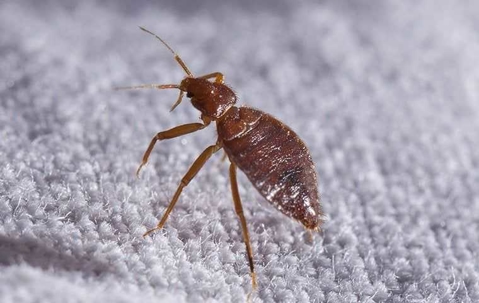A Breakdown of the Different Kinds of Pest Control Solutions
In the realm of bug control, a multitude of techniques exist to deal with the visibility and resolve of unwanted creatures. From the traditional use chemical pesticides to a lot more cutting-edge biological control solutions, each method uses distinctive benefits and constraints. As we navigate via the diverse landscape of insect control options, recognizing the details of each approach becomes paramount in identifying one of the most effective course of action. Stay tuned as we explore the nuanced world of pest control strategies and discover how each type plays an unique duty in guarding our settings.
Chemical Pesticides
Chemical pesticides are typically used in parasite control to efficiently eliminate a variety of bugs and other parasites. These pesticides function by targeting the anxious system of the bugs, disrupting their regular features, and ultimately bring about their demise. The use of chemical pesticides has actually been a staple in the insect control sector for decades due to their effectiveness and quick outcomes.

Nonetheless, it is necessary to use chemical pesticides with care as a result of their potential harmful effects on the environment and non-target species. Improper application or overuse of these pesticides can lead to pollution, harm to helpful pests, and resistance development in bug populations. It is vital to adhere to security guidelines and policies when using chemical pesticides for parasite control.
Biological Control Approaches
Considering the possible environmental impacts and threats related to chemical pesticides, biological control techniques offer an even more sustainable strategy to managing parasite populaces. Biological control entails making use of all-natural opponents, such as predators, virus, and parasites, to suppress bug populaces. This method is usually much more targeted, influencing just the specific insect varieties while minimizing damage to beneficial insects, people, and the setting.

One advantage of biological control is its lasting performance. When established, natural opponents can help regulate pest populaces constantly without the need for duplicated applications of pesticides. Additionally, organic control is commonly a lot more affordable and can aid decrease chemical resistance in insect populaces gradually. In general, organic control techniques provide a lasting and ecologically friendly remedy to pest management.

Mechanical Bug Control
Mechanical pest control includes the physical control or elimination of parasites to manage their populations efficiently. This technique is usually employed combined with other insect control methods for thorough parasite monitoring. One usual example of mechanical pest control is using traps to capture rodents or insects. These traps can be set up in strategic locations where pests are recognized to dwell, aiding to lower their numbers.
One more mechanical approach is the usage of obstacles such as internet, displays, or fencings to block parasites from getting in certain areas. By literally avoiding insects from accessing a place, the possibility of invasions or damage can be significantly lowered. Additionally, hand-operated techniques like handpicking pest control people insects off frameworks or plants can be efficient for smaller-scale infestations.
While mechanical bug control techniques can be labor-intensive, they offer a non-chemical choice that can be lasting and eco friendly. By targeting pests directly, mechanical control strategies can assist maintain insect populaces in check without depending on pesticides.
Natural Remedies
Using all-natural solutions for pest control provides a environment-friendly and lasting strategy to managing pest populations without resorting to chemical interventions. Natural remedies include utilizing compounds obtained from plants, minerals, or other naturally happening sources to discourage or get rid of parasites.
In addition, essential oils such as tea tree oil or neem oil have insecticidal homes that can successfully manage insects while being risk-free for the environment. Another natural solution is presenting helpful insects like ladybugs or praying mantises to your yard to exploit unsafe parasites. By site web integrating these natural services into parasite monitoring methods, individuals can reduce their dependence on synthetic chemicals and advertise a much healthier, a lot more balanced ecosystem.
Integrated Parasite Administration
Integrated Insect Management (IPM) is a thorough technique that combines various Read Full Report methods to efficiently manage pest populations while minimizing dangers to human health and the setting. IPM includes the integration of numerous insect control approaches such as biological control, environment control, modification of cultural techniques, and making use of resistant plant varieties. By using a combination of these methods, IPM aims to minimize reliance on chemical pesticides, which can have unfavorable impacts on ecological communities and human health.
One key facet of IPM is the emphasis on avoidance. By implementing procedures to avoid bug problems before they take place, such as maintaining appropriate hygiene and sealing entrance points, the requirement for responsive insect control actions is minimized. Tracking and normal inspections play a critical role in IPM, permitting very early discovery of pest problems and prompt intervention.
Final Thought
In final thought, the numerous kinds of bug control solutions provide a range of choices for successfully managing bug invasions. Biological control approaches utilize all-natural killers to control insects. Integrated Insect Management combines multiple approaches for an all natural strategy to pest control.
Chemical chemicals are typically used in parasite control to properly get rid of a broad array of bugs and other pests.Mechanical bug control includes the physical manipulation or elimination of insects to handle their populations properly (Kings exterminator cincinnati).Making use of natural solutions for insect control supplies a environment-friendly and sustainable technique to managing bug populaces without resorting to chemical interventions.Integrated Bug Management (IPM) is a detailed approach that integrates numerous techniques to properly control pest populations while decreasing risks to human health and wellness and the setting.In conclusion, the numerous types of bug control solutions use an array of options for successfully taking care of pest invasions